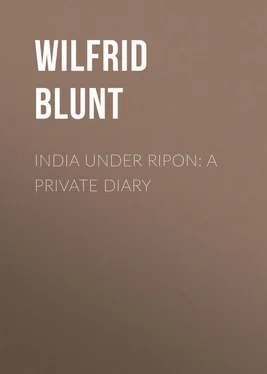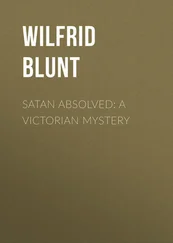Wilfrid Blunt - India Under Ripon - A Private Diary
Здесь есть возможность читать онлайн «Wilfrid Blunt - India Under Ripon - A Private Diary» — ознакомительный отрывок электронной книги совершенно бесплатно, а после прочтения отрывка купить полную версию. В некоторых случаях можно слушать аудио, скачать через торрент в формате fb2 и присутствует краткое содержание. Жанр: foreign_antique, foreign_prose, на английском языке. Описание произведения, (предисловие) а так же отзывы посетителей доступны на портале библиотеки ЛибКат.
- Название:India Under Ripon: A Private Diary
- Автор:
- Жанр:
- Год:неизвестен
- ISBN:нет данных
- Рейтинг книги:4 / 5. Голосов: 1
-
Избранное:Добавить в избранное
- Отзывы:
-
Ваша оценка:
- 80
- 1
- 2
- 3
- 4
- 5
India Under Ripon: A Private Diary: краткое содержание, описание и аннотация
Предлагаем к чтению аннотацию, описание, краткое содержание или предисловие (зависит от того, что написал сам автор книги «India Under Ripon: A Private Diary»). Если вы не нашли необходимую информацию о книге — напишите в комментариях, мы постараемся отыскать её.
India Under Ripon: A Private Diary — читать онлайн ознакомительный отрывок
Ниже представлен текст книги, разбитый по страницам. Система сохранения места последней прочитанной страницы, позволяет с удобством читать онлайн бесплатно книгу «India Under Ripon: A Private Diary», без необходимости каждый раз заново искать на чём Вы остановились. Поставьте закладку, и сможете в любой момент перейти на страницу, на которой закончили чтение.
Интервал:
Закладка:
“ 30th Nov. – Out before breakfast to see the Nizam’s stables, a number of ungainly Walers, and another stable full of Arabs. These last were very nearly all small horses, and may likely enough have been bred in Nejd. Mohammed Ali Bey, the Nizam’s master of the horse, is of Persian descent, an admirable horseman and a good fellow.
“After breakfast another Arab visitor called, brother of the El Kaeti who made himself Sultan of Makala in Hadramaut with English help, also Seyd Ali Bilgrami, a Mohammedan from Delhi, one of those brought here by Salar Jung – ‘a great pity’ in Cordery’s opinion – to wake up public opinion. He has had a partly English education, and has an appointment as civil engineer. His brother, Seyd Huseyn, 3 3 Seyd Huseyn Bilgrami, now member of the Indian Council in London.
was old Salar Jung’s private secretary. He explained to us the state of parties here. At Salar Jung’s death the Minister’s son, Laik Ali, was appointed with the Peishkar, a local Hindu nobleman, to a joint commission of Government, the Nizam being a minor. The Peishkar paid little attention to business, and young Salar Jung was kept as far as possible in the background, the principal influence being exercised by a third official, Shems-el-Omra, an enemy of Salar Jung’s. And thus affairs had got into a bad state. This was encouraged by the Residency, whose policy it was to show that the native Government was unfit to keep order in the country. Under old Salar Jung the Hyderabad State had been as secure as any part of India.
“We drove in the afternoon through Secunderabad and the English cantonments to Bellarum, where the Resident has a country house.
“ 1st Dec. – To breakfast with Salar Jung. He showed us his late father’s horses. Among them two Arabs, the finest I ever saw, one an old white Hamdani Simri from Ibn Saoud’s stud in Nejd, the other also white, a Kehailan from Ibn Haddal, fifteen one in height, and the most perfect large Arab possible. The particulars of their breeding were given us by one Ali Abdallah, a man of Arab origin himself, he assured us, connected with the Ibn Haddal tribe. I sat next to Salar Jung at breakfast, on the other side of me being Seyd Ali Bilgrami already mentioned. With him I discussed the whole question of the future of Islam. He had read my book, but took what he called a more pessimistic view than I do. He agreed, however, with me that if we could get Arabi and the Azhar Liberals restored to Egypt, and so a religious basis for reform, the effect in India would be great. ‘We look,’ he said, ‘to Egypt and Mecca, far more than to Constantinople (Seyd Ali is a Shiah), but we are all very backward in India. A religious basis is indispensable.’ He then talked of the pilgrimage, and said he had been consulted by the English Government as to what should be done to improve the arrangements for it. He had referred them to my book. As a Shiah, he does not love the Sultan. The English Government would do far better to break that connection and protect the Arabs instead, but he was far from hopeful. Here at Hyderabad Salar Jung’s death had been an immense misfortune. Of Sheykh Jemal-ed-Din, whom he had known here, he said he was too much of a socialist and firebrand to carry through a reformation. He talked, too, of the Mahdi, wishing him success. He said that if he succeeded it would be repeating the history of Abdillah in the sixth century of the Hejra. On the whole, a very pleasant breakfast.
“In the evening Nawab Rasul Yar Khan, who after all had not been at the breakfast, came to see me, a good little alem of the Azhar type one knows so well in Egypt, liberal, socialistic, and an enthusiastic disciple of Jemal-ed-Din’s. He knows no English, but is learned in Persian, and to some extent in Arabic. In this last we conversed. He tells me the majority of the Mohammedans here are Sunnis, but there is little difference between them and the Shiahs, and no ill-feeling. The mass of the people are quite ignorant of all that goes on outside the Deccan, but they had heard of the Egyptian War, and had sympathized with Arabi. Of Lord Ripon and the disputes in India only those who knew English and could read the English papers had heard anything. He himself knew very little. There was no religious learning here, nor any body of learned men. In all India you would not find a teacher like Jemal-ed-Din. He produced with reverence out of his pocket a photograph of the Afghan Sheykh, and also a copy of the ‘Abu Nadara,’ in which my portrait had appeared, and he read out to us the poetry written under it. I asked him if there was no Mohammedan newspaper published here, and he said there was one. But when I gave him a copy of my Colombo speech for it, he was frightened, and asked whether the English Government would not be very angry. I like this little man extremely. He promised to call again on Monday.
“ 2nd Dec. – Ik Balet Dowlah (Vikar-el-Omra) called; he is of Salar Jung’s party, and a liberal, opposed to his brother Kurshid Jah (Shems-el-Omra), a conservative, and the directing spirit of the Peishkar party. The Residency, of course, supports the Peishkar party, as they get more power by working through the reactionaries opposed to reform, – precisely as in Egypt. Cordery is doing what he can to get rid of the clever young Mohammedans introduced from the north by the late Salar Jung. The ablest of these is Seyd Huseyn Bilgrami. Cordery sent for him this morning to tell him that he should leave Hyderabad as soon as possible, such was the Resident’s will. The arbitrary power of the Resident here is beyond belief. I notice that Ik Balet Dowlah trembled before the little red-faced Cordery like a boy. Seyd Huseyn does not tremble, but he will be obliged to go all the same. We had luncheon with him and his brothers to-day, all very clever men, as also with Mulvi Cheragh Ali, who is looked upon here as a member of the sect nicknamed ‘of nature’ by the old-fashioned Mohammedans, because they advocate a reformation political, social, and religious, on the lines described in my ‘Future of Islam’ three years ago. Only he thinks the present Sultan and Caliph might carry it into operation. This is because he has never visited Constantinople, and so does not know how hopeless that hope is. With these young men – and we discussed all these questions – one can talk as freely as with Englishmen. And I am not surprised at Cordery’s being afraid of them. The excuse for getting rid of them is that they are strangers here, which is true, for they are Delhi men. I doubt if Cordery is pleased at our going to their house.
“We went this evening at sundown to see the flying fox rookery in the Residency grounds. It was the most curious sight imaginable. All day long they hang, many hundreds of them together, head downwards from the branches, making the whole of the great tree look as if it were infected with some horrible blight. They are very large, having a spread of nearly three feet across the wings, but in the day time these are folded up. As the sun goes down and it begins to darken, they one by one awaken and stretch and scratch themselves, and at last one lets down a wing and a leg, and drops from his perch, and flaps away just like a great crow, and is followed by another and another, till there are thousands in the air, all going off in the same direction to some fruit garden which they know, and which they spend the night in pillaging.
“We dined with Major Clerk, already mentioned as the Nizam’s tutor. Cordery is trying to get rid of him, too, as he is an independent man, and is honest in looking to the Nizam’s interests instead of those of the Calcutta Foreign Office.
“ 3rd Dec. – Breakfast in the city with Sultan Nawaiz Jung, another of the Arabs resident here, who is, I find, actual Prince of Shehr Makalla in Hadramaut. Nearly all the Arabs at Hyderabad have come originally from the south-east coast of Arabia. He received us with great pomp, having soldiers of his own in chocolate uniforms, and sent a smart carriage with an escort of lancers to fetch us from the Residency. His house is in the City, a very pretty one, with palm trees growing in an inner court, painted carving, and a fountain. The dinner, however, was disappointing, being in the Anglo-Indian style, which is one of the worst schools of cookery in the world. Sultan Nawaiz is known in Arabia as El Kaiti, and has a poor reputation there, having gained his wealth and present principality with British aid by money-lending. Here, too, he is a money-lender, and at the Residency they say that the Hyderabad Government owes him thirty lakhs of rupees. He belongs to the Peishkar party, and talked at breakfast in terms of great ‘loyalty’ to the British Empire. This he may well do, as our Government supported his claims at Makalla, deporting his rival and victim to Zanzibar. He is not a pure bred Arab, and talks Arabic with some difficulty.
Читать дальшеИнтервал:
Закладка:
Похожие книги на «India Under Ripon: A Private Diary»
Представляем Вашему вниманию похожие книги на «India Under Ripon: A Private Diary» списком для выбора. Мы отобрали схожую по названию и смыслу литературу в надежде предоставить читателям больше вариантов отыскать новые, интересные, ещё непрочитанные произведения.
Обсуждение, отзывы о книге «India Under Ripon: A Private Diary» и просто собственные мнения читателей. Оставьте ваши комментарии, напишите, что Вы думаете о произведении, его смысле или главных героях. Укажите что конкретно понравилось, а что нет, и почему Вы так считаете.












